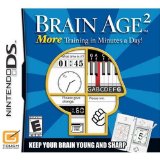Welcome to Purple Pawn, covering games played around the world by billions of people every day.
Yeah, “Brain Training” Games Are Probably a Waste of Time
12 Feb
Posted by Yehuda Berlinger as Electronic Games
 Despite featuring advertisements with the likes of Patrick Stewart and Julie Walters, electronic “brain training” games such as Brain Age aren’t going to help you, so says Lifespan in an article published in the journal Alzheimer’s & Dementia.
Despite featuring advertisements with the likes of Patrick Stewart and Julie Walters, electronic “brain training” games such as Brain Age aren’t going to help you, so says Lifespan in an article published in the journal Alzheimer’s & Dementia.
In fact, if you rely on them instead of performing the traditionally proposed health advice such as eating right and exercise, you’ll probably end up worse off than before.
The study of 67 schoolchildren aged 10 found homework, reading, playing puzzles such as Sudoku and board games such as Scrabble were just as good, if not better than, brain training games.
(source)
2 Comments
Sorry, the comment form is closed at this time.
Trending
- Massdrop.com
- Oh the Irony—Illuminati Card Game Continues to Inspire Conspiracy Theorists
- Home
- Footprints, an Educational Ecology Game
- USPS Adds Board Game Flat Rate Box
- Baila, the Estonian Drinking Card Game
- Crystal Caste Wins Dice Patent Suit Against Hasbro
- Mirror Game, Red and Blue
- Are Board Games Dangerous?
- The Truth About Dominoes On Sunday in Alabama
Archives
Most Popular Articles
- Oh the Irony—Illuminati Card Game Continues to Inspire Conspiracy Theorists
- The 20 Most Valuable Vintage Board Games
- The Truth About Dominoes On Sunday in Alabama
- Sequence Game, and Variants
- USPS Adds Board Game Flat Rate Box
- Baila, the Estonian Drinking Card Game
- The 13 Most Popular Dice Games
- Are Board Games Dangerous?
- Guess Who? The Naked Version
- What Happened to the Jewel Royale Chess Set?
Recent Posts
- Toy Fair 2019—Breaking Games
- Talisman Kingdom Hearts Edition
- Toy Fair 2019—Winning Moves
- Toy Fair 2019—Games Workshop
- Toy Fair 2019—Star Wars Lightsaber Academy
- Toy Fair 2019—Stranger Things Games
- Toy Fair 2019—HABA
- Licensing Roundup
- Game Bandit
- 2018 A Difficult Year For Hasbro But Not For D&D Or MtG
Recent Comments
- on Toy Fair 2019—Winning Moves
- on Game Bandit
- on Second Look—Dungeons & Dragons Waterdeep Dragon Heist
- on Crowdfunding Highlights
- on Beyblade SlingShock
- on Game Bandit
- on Game Bandit
- on Watch This Game!, the Board Game Review Board Game
- on Second Look—Vampire: The Masquerade 5th Edition
- on Palladium Books Loses Robotech IP License, Cancels Five-Year-Overdue Robotech RPG Tactics Kickstarter





Well, what’s at stake here?
Is the claim that there are other things that you could be doing that would have more effect? Undoubtedly so. But the Brain Training games are organised to support the *habit* of doing regular puzzles and mental activities. I don’t believe the report took this into account, and certainly the evidence is vague on all sides at this point. The studies I’ve seen recognise the value of repeated mental activities (of any kind) in fighting decrease in mental acuity.
Their main complaint seems to be that the Brain Training games might distract someone from pursuing regular physical exercise – I’m not really sure what their evidence is here. Is the same not true of (say) crosswords, and if not why not?
Plus, let’s not forget, both the Brain Training games include a large quantity of Sudoku puzzles, which are cited as superior mental exercise. I can’t speak for anyone else, but I spent much more time with this than with the core game, and found it much more enjoyable to solve these in a format that allowed me to make easy corrections/tell me when I made a mistake.
I have some issues with the way these games were marketing, but really, when I compare the marketing of these games to the marketing of, say, pharmaceuticals in the United States, I have great difficulty with the idea that the most suitable target for the finger of blame are these products.
Best wishes!
Points taken. While the criticism didn’t make it too clear, my criticism would be that the marketed game seems to be unnecessarily dull, medicinal, and likely expensive, compared to slews of games that are likely more fun, enjoyable, and free (or cheaper). You bring up medicine, and that’s a good comparison. It’s like hawking a pill that claims to do a lot of good by preying on the clueless; when standing in the sun for ten minutes would do just as much good as the pill. Or specialized sanitary wipes for door handles, when any old tissue will do as much good, and it’s not necessary anyway.
Also; sudoku is not marketed as brain improving, while these games are; I haven’t seen the ads for them (except the one to which I linked) so I don’t know if they make any promises, but its possible that morons in a hurry would think that they could do these games and abandon their important exercises if they only see the ads, whereas they wouldn’t make that mistake with sudoku which doesn’t make the same promises. I.e. just like certain supplements require a note that they are not actually medicine or meant to cure any specific diseases, these games should have the same warning label if they make health claims.